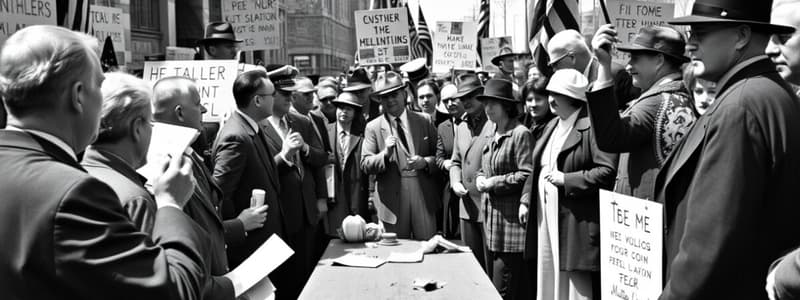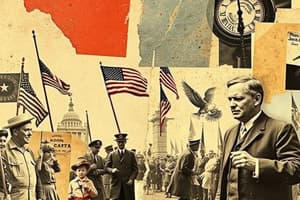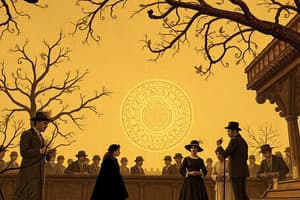Podcast
Questions and Answers
What were the goals of the Progressives?
What were the goals of the Progressives?
To combat monopolies, corruption, inefficiency, and social injustice by using the government as an agency of human welfare.
What issues were addressed by the major muckrakers?
What issues were addressed by the major muckrakers?
Corruption between big business and government, the corrupt practices of the Standard Oil Company, child labor abuses, and illiteracy among blacks in the South.
What changes did Progressives make at the city and state level?
What changes did Progressives make at the city and state level?
They implemented the city-manager system, attacked slumlords, and regulated railroads and trusts.
The Progressives were unsuccessful in combating social ills.
The Progressives were unsuccessful in combating social ills.
What were the three C's of the Square Deal?
What were the three C's of the Square Deal?
Was Teddy Roosevelt's reputation as a trustbuster undeserved?
Was Teddy Roosevelt's reputation as a trustbuster undeserved?
What was the effect of Upton Sinclair's book, The Jungle?
What was the effect of Upton Sinclair's book, The Jungle?
What factors led Americans to take an active interest in conservation?
What factors led Americans to take an active interest in conservation?
What were the results of the Roosevelt Panic of 1907?
What were the results of the Roosevelt Panic of 1907?
What was the legacy of Teddy Roosevelt's presidency?
What was the legacy of Teddy Roosevelt's presidency?
Why was William Howard Taft considered less suited for the presidency than he appeared?
Why was William Howard Taft considered less suited for the presidency than he appeared?
What was dollar diplomacy and how was it practiced?
What was dollar diplomacy and how was it practiced?
Flashcards are hidden until you start studying
Study Notes
Goals of the Progressives
- Aimed to combat monopolies, corruption, inefficiency, and social injustice.
- Promoted the use of government as an agency for human welfare.
Key Muckrakers and Their Contributions
- Lincoln Steffens exposed the corrupt alliance of big business with government.
- Ida Tarbell revealed Standard Oil Company's corruption.
- Thomas Lawson highlighted the unethical gathering of wealth in America.
- David Phillips noted that 75 out of 90 U.S. Senators represented railroads and trusts, not the public.
- Ray Stannard Baker reported that 90% of the 9 million Black Americans lived in the South, with a high illiteracy rate.
- John Spargo brought attention to child labor abuses.
Progressive Changes at City and State Levels
- Implemented expert-led commissions or city-manager systems for urban management.
- Focused on addressing social issues like slumlords, juvenile delinquency, and prostitution.
- Wisconsin, under Governor La Follette, shifted power from corporations to the people.
- Other states like Oregon and California followed suit in regulating railroads and trusts.
- Governor Charles Evans Hughes of New York gained recognition for investigating gas and insurance company practices.
Success in Combating Social Ills
- Achieved significant advancements in reducing child labor; Müller vs. Oregon case established laws for protecting women workers.
- Organizations such as the Woman's Christian Temperance Union and Anti-Saloon League pioneered the anti-liquor movement.
- The 18th Amendment, enacted in 1919, prohibited alcohol sales and consumption.
The Three C's of the Square Deal
- Focused on controlling corporations, protecting consumers, and conserving natural resources.
Teddy Roosevelt's Trustbusting Legacy
- Targeted harmful monopolies but favored economically successful trusts, aiming for government dominance over business.
- His approach to trust regulation was more moderate than aggressive.
Impact of Upton Sinclair's "The Jungle"
- The book revealed unsanitary conditions in food production, leading to public outrage.
Factors Influencing Conservation Interest
- Influenced by conservationists like Gifford Pinchot and the passage of the Newlands Act.
- Roosevelt preserved large areas of forestry and established federal reserves, earmarking resources for irrigation and power.
Consequences of the Roosevelt Panic of 1907
- The panic prompted vital fiscal reforms, leading to the Aldrich-Vreeland Act of 1908, which addressed banking crises and money circulation issues.
Legacy of Teddy Roosevelt's Presidency
- Seen as a president who balanced capitalism, fostering an environment between individualism and collectivism, while initiating a conservation movement.
Assessment of William Howard Taft
- Lacked the charisma of a strong political leader; passive in Congress and resistant to criticism.
- More focused on maintaining the status quo rather than enacting significant changes.
Dollar Diplomacy Explained
- Policy encouraged Wall Street bankers to invest surplus dollars in foreign areas critical to U.S. interests.
- Involved proposals for American and foreign bankers to manage railroads in China and significant investments in regions like Honduras and Haiti.
Studying That Suits You
Use AI to generate personalized quizzes and flashcards to suit your learning preferences.




